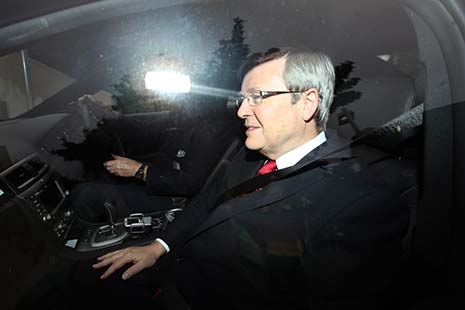KEVIN Rudd – the man with a great future behind him – is likely to leave an ambiguous legacy now that his immediate ambitions to seize back the prime ministership have been thwarted, apparently decisively. While he will always be acknowledged within the Labor Party for his feat of winning government from John Howard in 2007, he can now be listed among Labor’s great wreckers in the company of Billy Hughes, Jack Lang and Vince Gair.
Damaging leaks against Julia Gillard caused disruptive distractions during the 2010 election campaign, with all evidence suggesting Rudd as the source – an act as contemptible as a political act can be. The prime minister, rightly, called it sabotage.
Then, here in the crucial mid-term of a hung parliament and a minority government, Rudd launched an extraordinary public campaign against the prime minister and the very government of which he was a part until last week. The announcement of his resignation as foreign minister was made overseas and was calculated to inflict maximum damage.
The retention of a professional lobbyist to manage his leadership challenge brings yet another unsavoury American element into our politics, suggesting that influence can be bought and reducing politics to a glitzy media sideshow. The orchestrated street walk in Brisbane on Saturday was a case in point: pictures on all the television channels showed a smiling pop star–like Rudd being mobbed by what he likes to call the punters.
With his carefully publicised religious observance, his loyal and devoted wife by his side and his reported (but denied) description of Julia Gillard as childless, an atheist and an ex-communist, Rudd could just as easily be campaigning for the US Republican Party’s nomination using a coded language of moral values and raw populism.
The so-called people’s power on which he ran, based on snapshot opinion polls, is predicated on the flawed argument that it is the people, not the parties, or indeed parliament, that decides on the hiring and firing of prime ministers. History tells us that of the twenty-six former prime ministers in Australia, only ten lost office by way of election; precisely half were removed by their own party.
It is not without precedent for a former prime minister in Australia to be waiting by the phone for his erstwhile colleagues to come to their collective senses and plead with him to return. This was the case with Stanley Melbourne Bruce, who lost his seat and the prime ministership in 1929 only to return to parliament in 1931, serving as a junior minister before being posted to London as High Commissioner. With the conservative government being led by a Labor renegade in Joe Lyons, both Bruce and his supporters looked for an opportunity, but the delusional Bruce insisted he would not simply re-enter the political fray: he would have to be drafted. And the terms for that involved being unencumbered by party.
Rudd, in his campaign speech in Brisbane on Friday, was on a similar path: the Labor Party he would lead would have to change. Caucus would no longer exercise control over the vote; members could vote on any issue as they pleased. He was suggesting, in other words, that party discipline would cease to exist, as would the discipline exercised by the organisation over preselection. This formula comes delusionally close to the position of Bruce: no party, just me.
That “me” message from Rudd sends a chill through those who worked with him. As one of those who were instrumental in his removal in 2010 said to me: “The great fear we had was that before too long the real Rudd would emerge in public, and that would be the end.”
For all the trouble Rudd has caused he has at least done Julia Gillard a favour or two. The fact that a ballot was held cauterises the wound left untreated in 2010 and confers a belated legitimacy on the prime minister’s leadership. Further, Gillard’s inability to construct a persuasive narrative explaining those fast-moving events of mid 2010, and specifically her role in them, had cast her in the role of assassin, yet at her media conference in Adelaide on Friday she laid out the process, and more importantly the reasons, behind the leadership change. It was plausible, compelling and reasonable. It was a story that had to be told.
Of the other wreckers, Billy Hughes brought down a government, Jack Lang split his party and tried to smash a federal Labor government, while Vince Gair in his betrayal brought Labor rule in Queensland to an end, ushering in more than thirty years of conservative dominance.
Just how much damage Rudd has inflicted is yet to be seen, and nor do we know what he might do in future as he presumably waits for yet another opportunity. •




